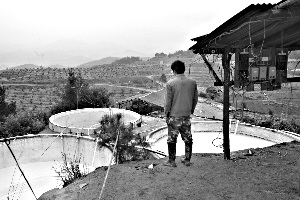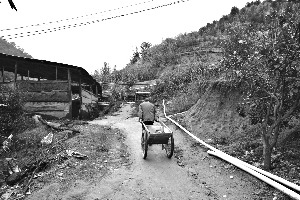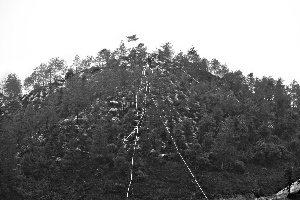From Chinese Media
The plight of China's rare earth mining
Updated: 2011-03-24 19:04
By Zhang Jiawei (chinadaily.com.cn)
"I am so dead," Huang Renzhu said in great disappointment after making dozens of calls but still not managing to buy a single gram of rare earth for his company in this city, where a shovel into the ground may bring plenty of riches.
It was in late February when Huang, who heads a company that produces permanent magnet material in Ganzhou city, East China's Jiangxi province, felt an obvious crunch in rare earth supplies, Beijing News said.
|
 A man stands at an illegal rare earth mining site at a mountaintop in Beitou township in Ganzhou, East China's Jiangxi province, Feb 18, 2011. [Photo/Beijing News] |
He believed people were hoarding the material for better prices after the Ministry of Land and Resources listed Ganzhou in the nation's rare earths planning areas on Jan 19, which led the city's illegal miners to decide to restrain for a while.
Huang is right in part. People and their poor equipment are seldom seen near the main roads, where illegal mining was once quite rampant, after the new regulation took effect.
| ||||
Deep in what locals call Gengbei Mountain in Beitou township, Quannan county in Ganzhou, dozens of people were busy at work on Feb 18 at a mining spot, which was ordered closed by the local government in 2009 due to its contamination of a river and the consequent protests by locals.
They were pumping liquid into one of the three pools with a thick plastic pipe. In one of the pools, milky sediment seemed to be the early progress they made in producing rare earths.
Villagers claim the workers were mining illegally. Zhong Guanming, the foreman, said he was just working for his boss, Lei Guosheng, and he didn't know whether it was illegal or not.
But according to Lei, he is only a nearby orchard contractor who sometimes goes to the mining spot to collect some remains that may contain rare earth. Lei said Zhong, who has been mining here since 2004, is responsible for all the mining.
Zeng Shumin, deputy director of the Quannan mine management bureau, said Lei was indeed collecting the remains of the illegal mine closed in 2009. But he refused to explain why the producing facilities were still running at the illegal mining spot.
|
 A man drags a two-wheel cart on a mountain path in Beitou township in Ganzhou, East China's Jiangxi province, Feb 17, 2011. [Photo/Beijing News] |
 White pipes are seen on a mountain in Beitou township in Ganzhou, East China's Jiangxi province, Feb 17, 2011. [Photo/Beijing News] |
Despite the illegal practices being frequently reported to the government and the fact that the miners may face hefty fines or end up in jail, the generous profits that can be expected have geared them up with the courage to take the risks.
A source from a rare earths processing firm in Ganzhou said a ton of rare earth mixed metal, a typical composition that includes approximately 50 percent cerium and 25 percent lanthanum, is priced at 150,000 yuan ($23,000), but costs only 30,000 yuan to produce.
China's quota policy allowed Ganzhou to produce 8,500 tons of rare earths in 2010, but industry insiders said the city produced at least 300,000 tons, more than triple its quota, Beijing News said.
Yang Xinhua, deputy director of Ganzhou's nonferrous metallurgy institute, said the country's aim of making Ganzhou a rare earth planning area was to enforce controls over its rare earth resources. And the city needs to solve the problem of illegal and excessive mining.
"If illegal mining cannot be stopped, rare earth planning would be a disaster for us," said a source from a down-stream rare earth processing firm.
He is concerned that legal mining would decline under the planning, which would cause a price surge in raw rare earth materials, encouraging more illegal mining. And illegal miners would hoard their products for higher prices, making survival of his firm even harder.
Failed monopoly
China has issued a total of 103 rare earth mining licenses, and Ganzhou alone owns 88. The city handed over all its licenses to the newly founded Ganzhou Rare Earth Mineral Industry Co Ltd in 2004, hoping for total control of the resources by monopolizing them.
The company was co-founded by city government and the governments of eight of its rare earth-rich counties, according to Ma Zhaoshan, deputy director of the city's mineral resources bureau.
It has eight branches, which would hand over their quotas to private mine contractors, whose products would then be bought by the company and then sold to down-stream firms in the city for further processing.
But the situation doesn't seem to have improved.
"Ganzhou Rare Earth Mineral has seemingly been controlling all the city's rare earth resources, but it's actually not a monopolizing company at all," said an expert on rare earth elements.
The expert said the company's intention is worth praising, but the mine bosses were the same people who had been operating since the company itself was not capable of exploring the resources. The bosses won't be satisfied by the company's profits and would try every means to take up illegal and excessive mining.
To make matters worse, the city's mining regulators can't effectively regulate the mine bosses who are under the umbrella of the company, which is more like a government agency.
A new business
Yang Xinhua said the company should get its hands dirty and explore the mines on its own, but "that is too hard," according to Guo Xiaobin, general manager of a rare earth company in Ganzhou.
"The mines on the mountains have all been controlled by private miners," Guo said, adding that those who don't want to take the risk of mining illegally would sell the mines to others, which is called "mountain speculation" by local people.
He Rencheng, a villager from Huangtang village in Beitou township, said the village's more than 500 mu (33 hectares) of mountains were sold at 450 yuan per mu by village officials to a contractor for 10 years of use.
More than 20,000 mu of mountains in Xingguang village, also in Beitou township, were sold to contractors for 500 to 1,000 yuan per mu. The buyers can explore the mountain for five to 10 years, with the longest being 40 years.
Transfer of the rare earth-rich mountains would bring huge amount of profits.
A contractor who bought several mountains for millions of yuan in Ganzhou said locals who have the money all rush to buy mountains and then sell them for 6,000 yuan per mu to those who are willing to take the risk of mining illegally.
Guo Xiaobin said some mountain speculators don't even bother measuring the area of the mountains -- they just sit and bid.
If Ganzhou Rare Earth wants to operate the mines, then it will have to pay huge prices to buy the rights from the speculators, Guo said.
"So, it will be a tough job," Guo said.
Specials

'Super moon'
The "Super Moon" arrives at its closest point to the Earth in 2011.

Radiation test
The probability of being exposed to a life-threatening level of radiation is quite slim.

Panic buying of salt
Worried Chinese shoppers stripped stores of salt on radiation fears.



